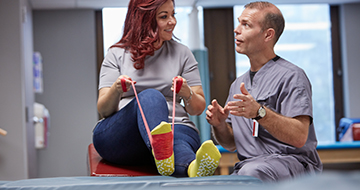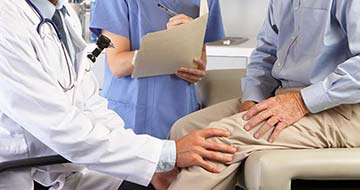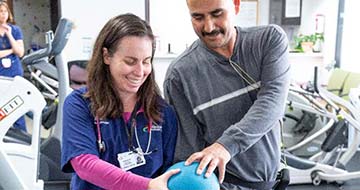Your Destination for Comprehensive Orthopedic Treatment
Joint and back pain are among the most common reasons for seeing an orthopedic physician, but help is on the way. The experienced orthopedic doctors at Carondelet Health Network provide comprehensive treatment for conditions that may impair your ability
to enjoy daily activities or maintain an active lifestyle. With compassionate care, you can count on us to deliver personalized and comprehensive treatment plans for orthopedic conditions, such as sports injuries, joint pain and back problems. We
incorporate personalized, end-to-end treatment plans—both surgical and nonsurgical.
What Is Orthopedic Medicine?
Orthopedics, also called orthopedic surgery, refers to the branch of medicine that treats injuries and diseases that affect the musculoskeletal system. This complex system consists of:
- Bones
- Joints
- Ligaments
- Tendons
- Muscles
- Associated nerves
- Arteries
- Overlying skin
What Does an Orthopedic Doctor Treat?
An orthopedic doctor refers to a primary care orthopedist or an orthopedic surgeon who treats musculoskeletal conditions. These conditions may be congenital (present at birth), resulting from an injury or a degenerative disease from age-related wear and
tear.
Orthopedic care often involves a team approach, including doctors and non-doctor specialists. Other health professionals that may be part of the team include the following:
- Neurologists
- Pain specialists
- Primary care doctors
- Psychiatrists
- Sports medicine specialists
- Athletic trainers
- Chiropractors
- Counselors
- Nurse practitioners
- Physical therapists
- Physician assistants
- Psychologists
- Social workers
- Vocational workers
The following are some of the conditions that can affect the bones, joints, ligaments, tendons and muscles:
- Joint pain from arthritis
- Bone fractures
- Soft tissue (muscle, tendon and ligament) injuries
- Back pain
- Neck pain
- Shoulder pain and problems, such as bursitis
- Carpal tunnel syndrome
- Overuse and sports injuries, including tendinitis, meniscus tears and anterior cruciate ligament (ACL) tears
- Congenital conditions, such as clubfoot and scoliosis
What to Expect During an Appointment with an Orthopedic Doctor?
During your first appointment, your orthopedic doctor may start with a physical examination and order any or a combination of the following imaging tests to help diagnose your condition:
- X-rays
- Bone scans
- Computed tomography (CT) scan
- Magnetic resonance imaging (MRI) scan
- Arthrogram (joint X-ray)
- Discography
When to See an Orthopedic Doctor?
For acute injuries, such as fractures and dislocations, your orthopedic doctor will have to manipulate or reset your affected joint and immobilize it using a splint, cast or brace.
There are various treatment options your orthopedic physician
may recommend if you have chronic musculoskeletal disorders, such as back pain or arthritis, including:
- Over-the-counter anti-inflammatory medications
- Rehabilitation and physical therapy
- Home exercise programs
- Injections
- Acupuncture
- Mobility aids
- Surgery, as a last resort
You may choose to see a primary care doctor if you have yet to find out the cause of your musculoskeletal symptoms. In many instances, it is reasonable to see an orthopedic specialist for the following symptoms and conditions:
- Constant or occasional pain for more than three months
- Limited range of motion
- Symptoms that affect daily mobility
- Difficulty standing or moving around
- An acute injury that does not respond to first aid treatments, such as ice or over-the-counter medications
If you need a second opinion about either a diagnosis or a treatment recommendation, you can also consult with an orthopedic surgeon. Go to the nearest emergency room if your injury requires immediate medical attention, such as:
- Fracture or broken bone
- Intense pain
- Inability to bear weight or move
- Severe bleeding
- Loss of consciousness
What Is an Orthopedic Surgeon?
Orthopedic surgeons treat conditions that affect the musculoskeletal system of patients of all ages, including newborns, young athletes and the elderly. Their scope of work involves:
- Diagnosis
- Treatment
- Rehabilitation
- Prevention
Much of an orthopedic surgeon's practice involves performing surgical procedures, but many conditions can improve through braces, casts, splints or physical therapy. While orthopedic surgeons are familiar with all aspects of the musculoskeletal system,
many specialize in certain areas, such as:
- Hand surgery – is a specialty that focuses on the treatment of diseases, injuries or abnormalities that affect the upper extremities, which may involve reattachment of amputated fingers
- Sports medicine – is a specialty that addresses the needs of athletes, such as treatment of injuries as well as conditioning and use of equipment to optimize an athlete's performance
- Pediatric orthopedics – pediatric orthopedists specialize in treating conditions that affect children, including scoliosis, cerebral palsy, congenital dislocation of the hips, clubfoot and trauma
- Spine surgery – orthopedic spine surgeons work with neurosurgeons to treat patients with significant spine problems
Foot and ankle orthopedics – is a specialty that predominantly involves the foot and ankle through both surgical
and nonsurgical procedures
- Joint replacement – is a specialty that focuses on treating worn-out joints by surgically replacing the joint with an artificial device. The majority of these cases involve the hip or knee and sometimes the ankle or shoulder
- Trauma surgery - is a particular area of orthopedics dedicated to managing patients with critical or multiple injuries to the musculoskeletal system. This specialty primarily involves surgical procedures and requires close cooperative efforts
with other specialties in surgery
- Oncology – an orthopedic tumor surgeon specializes in the management of benign and malignant tumors affecting the musculoskeletal system
Why Choose Carondelet Health Network Hospitals for Your Bone and Joint Care?
Our orthopedic team includes surgeons, physical therapists, nurses and patient navigators who work collaboratively to create an individualized treatment plan focused on your needs and recovery.
Our orthopedics hospital system offers a wide
range of orthopedic services, including:
- Minimally invasive joint replacement
- Arthroscopic surgery
- Repair of compound and simple fractures
- Torn ligaments or tendon repair
- Sports medicine
- Physical therapy and rehab programs
Insurance and Payment Plan Options
If you're living with constant joint pain, it's time to consider treatment options to help you get back to doing the things you love. The hospitals of Carondelet Health Network accept various insurance plans and offers flexible payment plans and convenient bill payment options so you can prioritize your health and get the high-quality care you need.
We offer payment
plans for most treatments and procedures, including but not limited to:
- Knee procedures
- Hip procedures
- Back procedures
How do you feel today? Let's get in touch and discuss ways to make you feel better. Our dedicated staff is ready to answer your questions about your insurance coverage and financial arrangements. Please call us at 833-850-5053 or visit our patient financial
resources page, so we can help you make decisions about your healthcare options, including financial obligations. Please get in touch with your insurance provider directly if you have specific questions about your coverage.
Find Orthopedic Doctors in Tucson, AZ
If you're experiencing pain or discomfort from an undiagnosed musculoskeletal condition or injury, the hospitals of Carondelet Health Network are your destination for bone, joint and muscle care in Tucson. Please
speak with one of our experienced orthopedic doctors for proper diagnosis and advice on the best orthopedic options for your aching bones, joints and muscles. Please call
833-290-8339 or
find a doctor near your location. If it's an emergency, please call
911 or go to the nearest emergency room.










